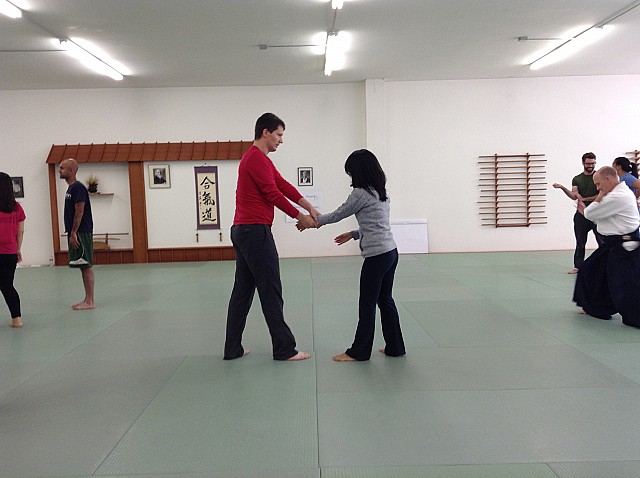I'm writing a new book about how to manage and resolve employee conflict. One of the key concepts in the book and a "ki" ingredient in working with conflict is acknowledgment. Possibly the most underutilized communication skill, acknowledgment is the secret to turning difficult conversations around.
Because it demonstrates a willingness and ability to reflect back a view or thought process that is different and possibly in opposition to your own, acknowledgment makes a powerful statement. It says, “I heard you, I’m trying to understand, and this is the meaning I’m making out of what I heard.” It shows respect and a disposition toward resolution.
Examples of acknowledging and clarifying statements:
- What I hear you saying is….
- That sounds important. Can you say more?
- I’m sorry my action had that impact on you.
- From what I gather, you’re hoping ….
- Thank you for this information.
- I appreciate your thinking on this.
- Is there anything else?
 Aikido Off the Mat: Tenkan
Aikido Off the Mat: Tenkan
In aikido, there’s a body movement called tenkan, most often translated as “convert” or “change.” Tenkan “converts” the attack into energy I can use and is a physical embodiment of acknowledgment.
Tenkan happens in aikido when I pivot from my face-to-face position with you to one in which I’m standing side by side with you. When I tenkan, a lot of things change:
We’re both facing the same direction. I can see what you’re seeing. Also...
- Anyone looking at us would say we’re partners rather than opponents.
- The issue is now positioned in front of our arms (our opinions and beliefs) so that we can direct our energy toward attacking and solving the problem, instead of attacking each other.
- It’s more difficult for you to hold on to my wrist. When I pivot to your side, there is nothing to fight.
- Things free up generally.
When I tenkan, I align with your energy. Verbal acknowledgment does this, too, and helps the conversation move toward problem solving, since you will not move off your position until your message is heard.
Acknowledgment takes practice. In my own difficult conversations, I try to understand my conversation partner well enough to make their case for them. When I can do this, I know I’ve picked up on their point of view. I learn where they stand and they see that, and we can move on.
The next time you're in a converstion that feels stuck, try asking a question, listening for understanding, and acknowledging what you hear. Don't stop there. Ask, listen, acknowledge, until your partner is completely finished telling their story.
Let me know how it goes!



Let’s discuss this post in the comments
Note: you don’t need to “log in” or “sign up” to comment. Simply enter your comment, then under the “sign up with Disqus” field enter your name. Then enter your email address and click the checkbox (that will appear) with the label “I’d rather comment as a guest.”